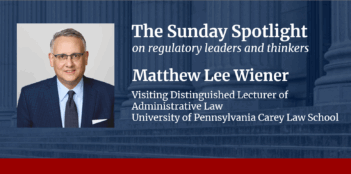
Scholar argues that regulation should be thought of as a verb, because regulating well demands dynamic and ongoing effort.
Regulation is often viewed as a set of rules or rule books. These rule books can be studied and read, with their pages turned and counted.
But legal scholar Cary Coglianese explains in a recent essay that this conception of regulation—as a noun—is at best incomplete. It is too easy for regulators to declare that a problem has been solved and to think that their work is done once a regulation is written down and officially adopted.
Coglianese, a professor of law at the University of Pennsylvania and the director of the Penn Program on Regulation, argues that the better way to think about regulation is as a verb. Regulators must be constantly attentive to and ready to respond to changing conditions that can affect their work. These changes can derive from new technologies, changing societal goals and values, expanding knowledge, shifting behavior by regulated entities, and new regulatory tools and tactics.
Coglianese builds the case for treating regulation as a verb by first offering a reminder of the importance of regulation. Because his essay draws from a keynote address delivered to an international conference of regulators focused on the work of professionals, he notes the need for good regulation of many professions. For example, in both harmful and beneficial ways, accountants’ work figured into financial crises such as the Enron scandal of 2001 and the Great Recession. Likewise, engineering professionals have figured into most every industrial accident or disaster, and doctors and pharmacists have contributed to or unwittingly collaborated in the over-prescriptions that led to the opioid epidemic.
Coglianese acknowledges, of course, that professionals are not the source of all of society’s troubles, and they are often responsible for much good in society. Nonetheless, their importance in society does highlight the potential need for their effective and ongoing regulation.
The purpose of regulation, Coglianese contends, is to modify human behavior and improve outcomes in the world. Because human behavior and the world are constantly changing, and because the tools available to regulators are too, regulation must be dynamic.
Coglianese tells a story of failed performance-based regulation in New Zealand as a way of illustrating the danger of viewing regulation as a noun. In the 1990s, New Zealand officials modified the country’s building codes to require regulated entities to attain goals focused on buildings’ structural integrity. But the codes left the regulated entities to decide how they would comply. Eventually, it became clear that some of the techniques builders used to meet the mandated goals also failed to protect buildings from moisture build-up. Due to the codes’ flexible nature and regulators’ passive approach that treated regulation as a noun, a mold infestation swept the country’s buildings, leading to an estimated $11 billion in damages.
Regulation as a verb involves “ongoing vigilance and action,” an attitude that Coglianese says could have prevented the devastation that New Zealand experienced due to its modified building codes.
According to Coglianese, approaching regulation as a verb is important because of five types of changes that regulators should always be watching for and ready to adapt to in response.
First, regulators should be attuned to changes in the world. These changes can take the form of new technologies. Social media and artificial intelligence (AI), for example, have introduced new harms to the world, such as increased misinformation. AI in particular has changed regulated professions and industries, and regulators have struggled to keep pace with the changes. COVID-19 and climate change are also changed conditions in the world that have presented unprecedented risks. These developments and others necessitate reconsidering regulations that already exist and adapting them to meet new challenges.
Second, changes in goals and values affect the work of regulators. These are also changes in the world, but they come in the form of changes in public attitudes or perceptions of risk. The #MeToo movement, for example, marked a change in societal norms about workplace harassment. The murder of George Floyd in 2020 prompted an outpouring of support for racial justice, even though the landscape of racial inequality had not fundamentally changed. Even absent other changes in the world, regulators should be ready to respond to changes in societal norms and values.
Third, regulators should be attentive to changes in knowledge. Advancing human knowledge about climate change, for example, has prompted changes in regulatory standards. Most areas of regulation are constantly experiencing changes in knowledge, and Coglianese argues that these changes often necessitate active responses.
Fourth, regulators should respond to changes in behavior. A problem is never solved just because a regulation has been adopted. Regulators must watch how regulated entities are responding. The New Zealand building codes example illustrates why this is so important. If regulators had noticed how builders’ behavior changed as a result of the codes, they could have responded in a more agile manner to minimize the damage of mold accretion.
Finally, new tools and tactics available to regulators should drive them to be open about how they regulate. Changes in technology for reporting or monitoring, improvements in machine-learning algorithms, and new knowledge about human behavior are all advancements that regulators can use to their advantage.
Coglianese draws on his extensive research on “regulatory excellence,” a concept which he has elsewhere characterized as being akin to a molecule composed of three essential linked qualities: the utmost integrity, stellar competence, and empathetic engagement. Coglianese explains that “at a submicroscopic level, atoms and molecules are in constant motion.” Similarly, regulatory excellence requires constant forward motion, instead of a static reliance on past achievements or the mere adoption of words on paper.
For all these reasons, Coglianese concludes that regulation must be considered a suite of ongoing actions. It must be treated, as he puts it, as a verb.



